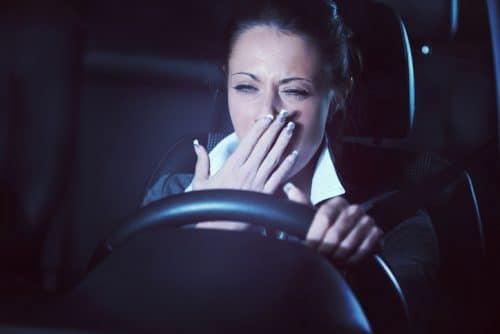We’re all sleep-deprived — but driving after sleeping too little is like driving drunk.

We all know the risks of driving while drunk or under the influence of drugs. But what many people don’t realize is that there are substantial risks involved with something that many of us do every single day — drive while tired.
According to a new study by the Automobile Association of America — commonly known as AAA — driving while drowsy contributes to over 20% of all fatal car crashes in the United States each year. Missing just 1 to 2 hours of sleep at night can actually double your risk of being injured in a wreck. According to the research cited in the study, drivers who got 5 or 6 hours of sleep, instead of the recommended 7, increased their odds of crashing by a factor of two.
However, despite these risks, over 1/3 of American drivers — 35% — get less than the recommended 7 hours of sleep each night, according to the Centers for Disease Control and Prevention. This fact — combined with the increase of other dangerous driving behaviors like texting and driving — may be why the incidence of traffic fatalities has continued to rise, despite the improvement in the safety of our cars and roadways. In 2015 alone, 28,300 people were killed in car crashes in the United States. An additional 4.4 million people suffered injuries in car accidents that required them to seek medical attention. As car accident attorneys, we know that the risks of drowsy and tired driving are all too real.
There are many warning signs that you are simply too tired to drive safely. They may include having trouble keeping your eyes open, drifting between lanes, or not remembering driving the past few miles. But many drivers involved in fatigue-related crashes had no symptoms of being tired beforehand. That is why it is important to be aware of your level of exhaustion before you get behind the wheel — and not wait until you are already driving to try to determine if it really safe enough to be on the road.
If you didn’t get at least 7 hours of sleep before driving, you can take action to prevent an exhaustion or fatigue-related car accident. This includes stopping your car so that you can sleep as soon as you are able to safely do so. Even 15 to 20 minutes of sleep can help you stay alert enough to make it safely home or to a place where you can get a longer rest. If necessary, you can also consume caffeine to help you stay alert — but only after you have taken a short nap if possible. If you haven’t already hit the road, plan ahead so that you build enough sleep time into your schedule. For example, if you know that you are taking a road trip and want to leave at 5 in the morning, go to bed extra early so that you aren’t exhausted for the trip. When possible, limit driving between midnight and 6 am, which is when many drowsy driving crashes occur. Finally, roll down the window if you feel yourself getting tired. While it isn’t a substitute for getting sleep, it can help to keep you alert if you are feeling sluggish.
Remember that other drivers on the road may also be tired, and be sure to be alert for signs that they are fatigued. Practice your defensive driving skills, and call 911 if you see someone who may be impaired by alcohol, drugs, or extreme exhaustion.
If you have been injured in a car accident, contact the Law Offices of Larry H. Parker today at 800-333-0000 or info@larryhparker.com to learn how we can help you recover for your losses. We are dedicated to fighting for the rights of our clients, and we never charge a fee unless we get money for you!



